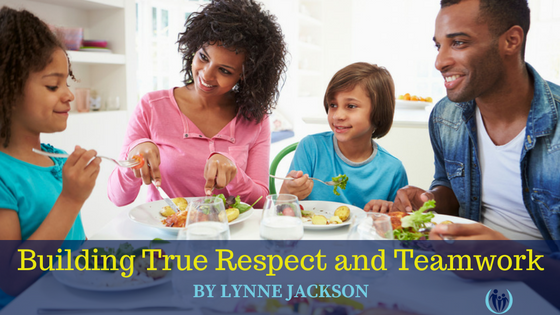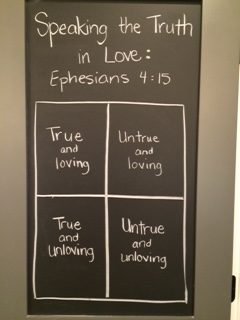
Building True Respect and Teamwork

Most of us agree that respect is an important skill to build in children which will empower them for their entire life. Whether it is for future work or family relationships, having the ability to set aside frustrations and grievances out of respect for one another is a life skill that will serve our children well. But, teaching respect and teamwork is a “ground up” operation. When kids are young they struggle to find ways to compromise and get along. It can be frustrating as parents, to know how to guide our children in respectful interactions with us as well as with each other.
One couple I recently coached, Don and Layna, were discouraged about the disrespectful language between the children in their home. They worried that things were not trending well and, with four kids, they had a lot of challenges! Their intense daughter, Alicia, especially seemed to struggle with respect, and often fired hurtful verbal zingers at her siblings and parents.
In their coaching session, Don and Layna were able to understand that Alicia was experiencing deep discouragement and it caused her to slip into disrespectful interactions. They realized that they needed to let go of the desire for a quick punishment, and began to see how they could encourage and teach all their kids to value kindness in their relationships.
Teaching Kids to Speak the Truth in Love
In our session we came up with a fun family learning activity to help their whole family grow in a desire to “speak the truth in love” – Ephesians 4:15. They practiced making statements that were “true and loving,” “untrue and loving,” “true and unloving,” and “untrue and unloving” (see graphic below). It also helped their kids discern what kinds of statements were loving and true, what kinds of statements weren’t, and what was the impact of each.
Don and Layna were kind and encouraging as they guided a discussion with their kids about ways that their words could be used to help each other rather than hurt. Importantly, Alicia didn’t feel singled out or criticized at all. In fact, she got so excited about the concept that she explained it to her teacher, and helped her teacher share it with her whole class at school.
Building a Team Identity
In addition to talking about speaking the truth in love, they also began to instill in their kids that their family is a team. So, if the kids left for school without slipping into conflict and disrespect, Layna would say, “Way to go, Team Benson!” Or if it didn’t go well, “Wait a minute, we are Team Benson! Let’s try again.” One of their sons, Connor, began to pick up on this, and remind each other of their identity as Team Benson.
Focusing on the Bright Spots
Don and Layna were diligent to encourage their kids when they saw respectful interactions and team camaraderie. For example:
- Layna privately said to Connor, “That’s so great that you noticed we were acting like a team. You were being a good leader by helping others see that.”
- “Alicia, when you told me it felt too ticklish when I was rubbing your arm, you spoke the truth in love. You didn’t make me feel dumb, and you said it really respectfully.”
As Don and Layna persisted in this proactive effort, they began to see the momentum in their family change. For the first time, Alicia began to experience remorse when she blew it, instead of feeling ashamed and blaming others for her outbursts. She now sometimes writes sincere apologies and offers a big hug if she’s been disrespectful. She also has occasionally begun to show exceptionally respectful responses – even under stress.
But a particularly big bonus for all this effort, is Layna’s observation: “I have noticed that my children have started to tell each other that they love them – “I love you, Alicia,” or “I love you, Connor.” What a wonderful reflection of Don and Layna’s love–love that trickled down to their kids and empowered them to care for their most important relationships with true, heart-felt respect.
Speaking the Truth in Love Activity:
1) Read the Scripture Ephesians 4:15 – Help your kids understand what this means – i.e. The more people make sure that the things they say are true and said in a loving way, the more wise and mature they become, and the more they follow Jesus’ example!
2) Make a Truth and Love Quadrant
-
 Either draw a quadrant on chalkboard or poster board, or distribute four pieces of paper among your kids and let them letter/draw pictures for each section of the quadrant; tape together. (In this example, comments about appearance are used to demonstrate how the activity works.)
Either draw a quadrant on chalkboard or poster board, or distribute four pieces of paper among your kids and let them letter/draw pictures for each section of the quadrant; tape together. (In this example, comments about appearance are used to demonstrate how the activity works.)
3) Have Fun Helping Kids Understand Each Section
- Share examples: Make statements (either real or fictitious) that would fit in each of the four categories, and explain why you chose that category for that statement.
- Let kids figure it out: You can make up example statements (that would fit your kids’ ages and interests) and have them identify which section the statements would fall in.
4) Ask Thought-provoking Questions – Choose one or two depending on age and interest of your kids:
- What happens to people who practice speaking true and kind things? (Be specific about school, job, friends, marriage, etc.)
- Who is someone outside our family that you think of as someone who speaks the truth in love? How do you feel around them?

- Number each of the four sections and let kids roll a dice or draw cards to choose a section for which to answer the questions below.
- What would happen at school (or home) if most of what people said to each other was this kind of statement?
- What do you think causes people to say each kind of statement?
5) Practice Making Kind and True Statements
- Go around the table and say one kind and true thing to say to each person at the table.
- In your daily interactions, be sure to keep an eye out for any time your kids say kind and true things to each other and help them feel really good about that.
God wants us to speak the truth in love with each other because that’s when our hearts feel connected and we have joy. When we do that we follow in his footsteps, because the Bible tells us God never lies, and everything he says comes from a heart of love for us. (Titus 1:2, 1 John 4:16)
Want more?
- Learn about our parent coaching options.
- Meet one of our coaches, Chad Hayenga.
- Read the story of Jerry, who had an epiphany during a coaching session that helped him have the relationship with his kids he longed for.
Sign up below to receive a weekly dose of encouragement straight to your inbox:





